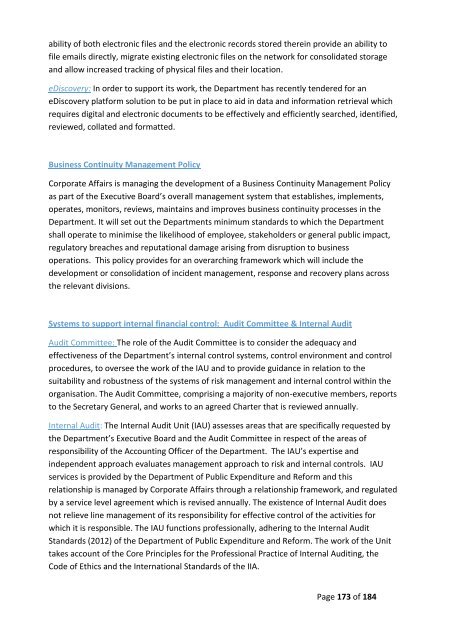Minister’s Brief
20160229%20Minister%20for%20Finance%20Brief%20redacted%20web
20160229%20Minister%20for%20Finance%20Brief%20redacted%20web
Create successful ePaper yourself
Turn your PDF publications into a flip-book with our unique Google optimized e-Paper software.
ability of both electronic files and the electronic records stored therein provide an ability to<br />
file emails directly, migrate existing electronic files on the network for consolidated storage<br />
and allow increased tracking of physical files and their location.<br />
eDiscovery: In order to support its work, the Department has recently tendered for an<br />
eDiscovery platform solution to be put in place to aid in data and information retrieval which<br />
requires digital and electronic documents to be effectively and efficiently searched, identified,<br />
reviewed, collated and formatted.<br />
Business Continuity Management Policy<br />
Corporate Affairs is managing the development of a Business Continuity Management Policy<br />
as part of the Executive Board’s overall management system that establishes, implements,<br />
operates, monitors, reviews, maintains and improves business continuity processes in the<br />
Department. It will set out the Departments minimum standards to which the Department<br />
shall operate to minimise the likelihood of employee, stakeholders or general public impact,<br />
regulatory breaches and reputational damage arising from disruption to business<br />
operations. This policy provides for an overarching framework which will include the<br />
development or consolidation of incident management, response and recovery plans across<br />
the relevant divisions.<br />
Systems to support internal financial control: Audit Committee & Internal Audit<br />
Audit Committee: The role of the Audit Committee is to consider the adequacy and<br />
effectiveness of the Department’s internal control systems, control environment and control<br />
procedures, to oversee the work of the IAU and to provide guidance in relation to the<br />
suitability and robustness of the systems of risk management and internal control within the<br />
organisation. The Audit Committee, comprising a majority of non-executive members, reports<br />
to the Secretary General, and works to an agreed Charter that is reviewed annually.<br />
Internal Audit: The Internal Audit Unit (IAU) assesses areas that are specifically requested by<br />
the Department’s Executive Board and the Audit Committee in respect of the areas of<br />
responsibility of the Accounting Officer of the Department. The IAU’s expertise and<br />
independent approach evaluates management approach to risk and internal controls. IAU<br />
services is provided by the Department of Public Expenditure and Reform and this<br />
relationship is managed by Corporate Affairs through a relationship framework, and regulated<br />
by a service level agreement which is revised annually. The existence of Internal Audit does<br />
not relieve line management of its responsibility for effective control of the activities for<br />
which it is responsible. The IAU functions professionally, adhering to the Internal Audit<br />
Standards (2012) of the Department of Public Expenditure and Reform. The work of the Unit<br />
takes account of the Core Principles for the Professional Practice of Internal Auditing, the<br />
Code of Ethics and the International Standards of the IIA.<br />
Page 173 of 184


